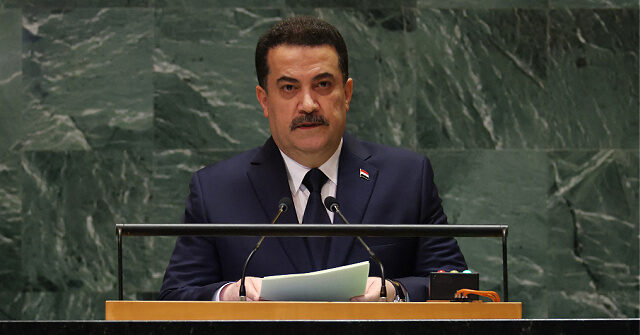Iraqi Prime Minister Mohammed Shia’ Al Sudani warned the United Nations in his General Assembly address on Thursday that the world faces a new wave of “occupation,” “terrorism,” and flagrant violations of international law, notably omitting mention of the Iran-backed jihadist terror groups wreaking havoc in his country and region.
Al-Sudani spent much of his speech condemning Israel for its ongoing self-defense operations in Gaza, declaring that “putting an end to the violations taking place in Palestine [sic] and the region is the responsibility of everyone, particularly the Security Council.” He also condemned Israel for strikes against the Iran-backed terrorist group Hezbollah, headquartered in Lebanon, again offering no context for why Israel was conducting military operations in the country at all.
The complete absence of any mention of Iran in Al-Sudani’s speech, which largely addressed regional crises Tehran is responsible for, is notable given the Iranian Islamist regime’s growing influence in his own country. In the past decade, the Iraqi government has empowered jihadist Shiite guerrillas through the formalization of the Popular Mobilization Forces (PMF), Iran-backed militias that have repeatedly posed a threat to American forces in the country, there to help fight the Islamic State terrorist group. Baghdad has idly stood by while some of the most belligerent PMF units, most prominently Kata’ib Hezbollah (KH), threatened attacks on U.S. forces — and condemned the American government for violating its “sovereignty” when responding to the KH threat.
Iran’s colonization of Iraq has dramatically accelerated since its proxy, Hamas, conducted an unprecedented massacre in Israel on October 7. Reports in September indicated that Hamas has moved into offices in Baghdad, as have jihadis representing the Houthi terrorists of Yemen. Iranian President Masoud Pezeshkian made a visit to Iraq his first international trip since his inauguration, timing his presence in the country with Iraqi pressure on Washington to leave the country.
Al-Sudani appeared to be addressing precisely the kinds of threats that Iran presents to the world in his speech, but without mentioning the country — and targeting Israel for his criticism.
“Important principles such as sovereignty, territorial integrity, multilateral cooperation, the laws of war,” he listed, “humanitarian laws, and the international humanitarian law and the responsibility to protect and the right to self determination are being ignored.”
“The world is being pushed towards full-scale confrontations and conflicts while the United Nations Security Council is powerless and without rule,” he lamented.
Al-Sudani condemned “the occupation and annexation of territories” and the alleged “brutal aggression” against Lebanon, referring to Israel’s campaign to push Hezbollah out of its land. Hezbollah, acting in solidarity with Hamas, has made much of northern Israel uninhabitable, displacing an estimated 60,500 civilians.
In Iraq, in contrast, he painted a rosy political picture, insisting there were “good developments” in his country, including infrastructure development and “the restoration of life to cities” after the collapse of the Islamic State “caliphate” in 2017.
“We have achieved a victory over terrorism … soon we will crown this victory over this terrorist organization with a joint declaration with our allies and friends,” he promised.
The prime minister also requested that the international community “support our efforts to recover the looted assets that are Iraq’s right and to end the legal and legislative obstacles placed by some countries in order to provide a safe haven for corruption related funds.”
He concluded with a claim that Iraq is a victim of “climate change” and a call for international support, presumably financial in nature, to help avoid “the displacement of millions in search of stability, thus exacerbating social and political crises” as a result of “desertification.”
